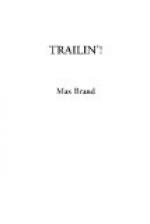“Long ride for to-night, isn’t it?”
“Yes, but we’ll bunk on the way and finish up early in the morning.”
“Then you’ll have a chance to teach him Western manners on the way, Steve.”
“Manners?” queried the Easterner, smiling up to the girl.
She turned, caught him beneath the chin with one hand, tilting his face, and raised the lessoning forefinger of the other while she stared down at him with a half frown and a half smile like a schoolteacher about to discipline a recalcitrant boy.
“Western manners,” she said, “mean first not to doubt a man till he tries to double-cross you, and not to trust him till he saves your life; to keep your gun inside the leather till you’re backed up against the wall, and then to start shootin’ as soon as the muzzle is past the holster. Then the thing to remember is that the fast shootin’ is fine, but sure shootin’ is a lot better. D’you get me?”
“That’s a fine sermon,” smiled Bard, “but you’re too young to make a convincing preacher, Miss Fortune.”
“Misfortune,” said the girl quickly, “don’t have to be old to do a lot of teachin’.”
She sat back and regarded him with something of a frown and with folded arms.
He said with a sudden earnestness: “You seem to take it for granted that I’m due for a lot of trouble.”
But she shook her head gloomily.
“I know what you’re due for; I can see it in your eyes; I can hear it in your way of talkin’. If you was to ride the range with a sheriff on one side of you and a marshal on the other you couldn’t help fallin’ into trouble.”
“As a fortune-teller,” remarked Nash, “you’d make a good undertaker, Sally.”
“Shut up, Steve. I’ve seen this bird in action and I know what I’m talking about. When you coming back this way, Bard?”
He said thoughtfully: “Perhaps to-morrow night—perhaps—”
“It ought to be to-morrow night,” she said pointedly, her eyes on Nash.
The latter had pushed his chair back a trifle and sat now with downward head and his right hand resting lightly on his thigh. Only the place in which they sat was illumined by the two lamps, and the forward part of the room, nearer the street, was a seat of shadows, wavering when the wind stirred the flame in one of the lamps or sent it smoking up the chimney. Sally and Bard sat with their backs to the door, and Nash half facing it.
“Steve,” she said, with a sudden low tenseness of voice that sent a chill up Bard’s spinal cord, “Steve, what’s wrong?”
“This,” answered the cowboy calmly, and whirling in his chair, his gun flashed and exploded.
They sprang up in time to see the bulky form of Butch Conklin rise out of the shadows in the front part of the room with outstretched arms, from one of which a revolver dropped clattering to the floor. Backward he reeled as though a hand were pulling him from behind, and then measured his length with a crash on the floor.




